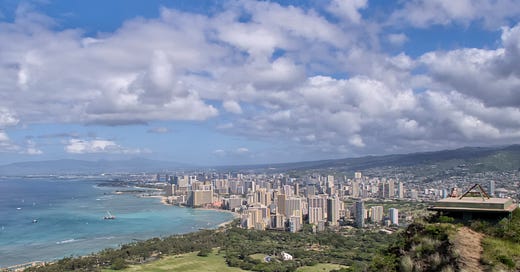Honolulu and Big Oil face off in court
On Friday, industry lawyers asked a judge to dismiss Honolulu’s case targeting Big Oil’s deception.
Emily Sanders is the Center for Climate Integrity’s editorial lead. Catch up with her on Twitter here.
Honolulu city officials sued eight oil giants last year for lying and failing to warn the public about the catastrophic climate damages their products would cause.
Hawaiʻi’s largest city and county is now regularly threatened by supercharged storms, rising seas, and heat waves, and the municipality's lawsuit seeks to make the Big Oil defendants pay their fair share of the tens of billions of dollars it will cost to protect property, infrastructure, and jobs.
In February, U.S. Judge Derrick Watson dealt Big Oil a blow when he ruled that Honolulu and Maui’s climate liability cases could proceed in state court, where they were initially filed. On Friday, lawyers for BP, Chevron, Exxon, Shell and other fossil fuel companies took to a Zoom courtroom to ask a state court judge to toss Honolulu’s case entirely.
We’re here with a Special Edition of EXXONKNEWS to answer all your burning questions.
First off: What is Honolulu’s case really about?
Vic Sher, the attorney representing the City of Honolulu before the First Circuit Court of Hawaiʻi, described the aim of this case during Friday’s hearing: to hold the companies accountable for lying about the dangers they knew their products would cause, and make them pay their fair share of the resulting damage.
“For decades these defendants have concealed and misrepresented the climate impacts of their products, using sophisticated disinformation campaigns to discredit the science of global warming,” Sher said. “...In turn, these deceptive commercial activities… inflated the overall consumption of fossil fuels, which increased greenhouse gas emissions, which exacerbated climate change, which created the hazardous environmental conditions that are already affecting Honolulu and will only get worse.”
Speaking on behalf of all the Big Oil defendants, former EXXONKNEWS guest star and Chevron attorney Ted Boutrous prefaced his argument by saying “I think we can all agree” that climate change is an “exceedingly important issue of utmost public concern” (please clap). But in a well-worn attempt to misrepresent these cases, Boutrous went on to (falsely) claim that Honolulu’s suit is not about deceptive behavior, but instead is an attempt to regulate emissions and shape climate policy through the courts.
In response, Sher reminded the court that Honolulu’s lawsuit doesn’t seek to punish oil companies for their emissions or end the sale of oil and gas. Instead, it targets those companies’ deceptive marketing and failure to warn about the harm their products would cause. “They provided no warnings commensurate with the danger. Instead, they waged disinformation campaigns.”
Judge Jeffrey Crabtree, presiding over Honolulu’s case, himself explained the logic to Boutrous: “They’re [Honolulu] saying, if the tortious [harmful] marketing stopped, that’s the key factor,” he said. “It doesn’t have anything to do with regulating air pollution elsewhere.”
In his February decision, U.S. Judge Watson reiterated this point, writing that Big Oil’s arguments “misconstrue” the claims made by the city and county, which are about “alleged concealment of the dangers of fossil fuels, rather than the acts of extracting, processing, and delivering those fuels.”


Does Hawaiʻi have jurisdiction?
In another Big Oil motion to dismiss the case, Boutrous argued that Hawaiʻi state court is the wrong place to hear Honolulu’s claims because the vast majority of the greenhouse gas emissions derived from defendants’ fossil fuel products were emitted outside of Hawaiʻi. But again, this lawsuit is about deception, not emissions. The oil companies’ alleged deceptive acts were aimed at everyone living in all 50 states, and these acts have caused Honolulu to suffer significant climate-related impacts and face astronomical adaptation costs which are detailed in its complaint — and can only be addressed in Hawaiʻi.
As Vic Sher put it, if Mr. Boutrous threw a rock at his home in Honolulu, it wouldn’t matter if he was standing in Hawaiʻi or on the mainland — it’s where the damage occurred that counts.
The precedent that clearly allows Honolulu’s case to proceed in state court was in fact established earlier this year, when the U.S. Supreme Court ruled 8-0 that both Minnesota and Montana state courts had jurisdiction over two vehicle crash (product liability) lawsuits against Ford Motor Company, even though the vehicles involved were initially sold out of state.
Is Chevron actually the victim here?
Friday’s arguments also included a Big-Oil-as-victim routine in the form of an anti-SLAPP (strategic litigation against public participation) motion brought by Chevron. Anti-SLAPP laws were developed to protect against lawsuits that are intended to censor and intimidate the public from exercising their right to free speech. These laws serve to protect the public from corporate abuses, not the other way around.
Boutrous claimed that the “First Amendment bars [Honolulu’s] case” — which is, if you will, a load of hooey. As Matt Edling, another lawyer for the city of Honolulu, put it, “The First Amendment does not protect Chevron’s false and misleading [advertising.]”
This past June, Massachusetts’ lawsuit seeking to hold Exxon accountable for consumer fraud became the first climate accountability case to survive Big Oil’s motions to dismiss. If Honolulu’s case similarly survives misleading Big Oil arguments, it will be the first tort liability lawsuit for climate damages to clear that same hurdle — and be one step closer to a full trial in front of a jury. We will, as always, keep you updated on what comes next.



